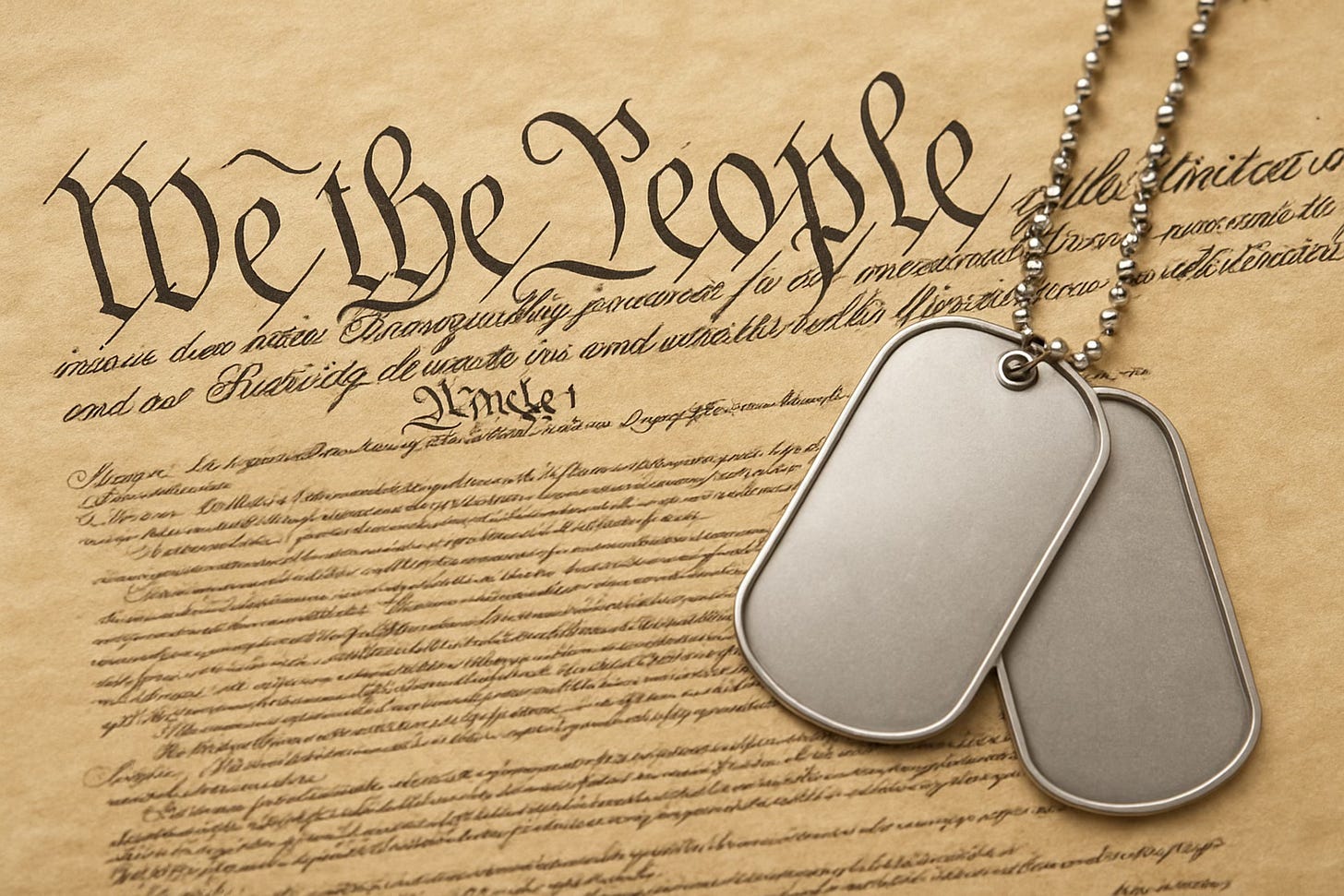No Mr. President, Reminding Troops to Follow the Constitution Is Not Sedition
How Article 92 defines lawful orders — and why refusing illegal ones is mandatory.
When headlines start throwing around words like “sedition,” it’s worth slowing down and looking at what the law actually requires from the U.S. military. In the last few weeks, some political voices have accused lawmakers of wrongdoing simply for reminding service members that their oath is to the Constitution, not any individual. But under the Uniform Code of Military Justice — the legal backbone of the armed forces — that reminder is not only appropriate, it’s literally the law.
This post breaks down Article 92 of the UCMJ, the rule that governs obedience to lawful orders, and explains why troops are legally obligated to refuse commands that violate the Constitution.
What Article 92 Actually Requires
Article 92 is the section of the UCMJ titled Failure to Obey Order or Regulation. It creates three punishable offenses:
Failing to obey a lawful general order or regulation
Failing to obey any other lawful order
Dereliction of duty — ignoring, neglecting, or failing to perform assigned responsibilities
The operative word is lawful. The UCMJ does not require blind obedience. If an order is unlawful, unconstitutional, or outside the authority of the commander issuing it, troops may not follow it — and cannot be punished under Article 92 for refusing.
To prosecute an Article 92 violation, the government must prove that:
a lawful order existed,
the service member knew about it,
it was specific and within the commander’s authority, and
the member willfully or negligently failed to comply.
If the order itself is unlawful, the analysis stops there.
The Duty to Refuse Illegal Orders
Since World War II, U.S. military law has made one thing unequivocally clear: troops have a legal duty to disobey unlawful orders. Obeying an illegal command can itself be a crime — a fact reinforced in some of the military’s most defining justice cases.
Key Cases and Events That Shaped Modern Interpretation
The My Lai Massacre (1968)
Lieutenant William Calley and others were prosecuted for participating in unlawful killings and violating rules of engagement. The case established that “I was just following orders” is not a defense.
Reference: United States v. Calley (1973).
Abu Ghraib (2003–2004)
Troops were charged under Article 92 and Article 93 for detainee abuse. These prosecutions reaffirmed that unlawful instructions cannot shield personnel from responsibility — and that commanders are accountable for preventing misconduct.
Reference: Fay Report (2004).
Modern refusals of unlawful orders
Service members have historically refused illegal orders involving torture, unlawful searches, and unauthorized deployments. Courts have consistently upheld their right and obligation to do so.
Reference: DoD Law of War Manual §5.3.
Post–January 6 DoD guidance (2021)
After the attack on the Capitol, the Pentagon reminded all personnel that participating in insurrectionist activity — or following unconstitutional political directives — violates Article 92.
Reference: DoD Memorandum on Extremism (2021).
Why Article 92 Matters Right Now
Charging lawmakers with “sedition” for telling troops to follow the Constitution is legally upside-down. Under Article 92, service members must refuse:
unconstitutional orders
orders that exceed presidential authority
orders that illegally target political opponents
orders that violate federal or state law
Reaffirming this isn’t sedition — it’s responsible governance and a reminder of the oath every service member takes.
Plain-Language Takeaway
Article 92 makes it a crime to disobey lawful orders — but it also protects troops from being compelled to carry out illegal acts. The military’s duty is to the Constitution first. Reminding service members of that obligation isn’t radical; it’s the foundation of American civil-military law.





“What’s more…..” following your “illegal orders” are a Court Martial offence! at Nuremberg “just following orders…” got Nazis HUNG!